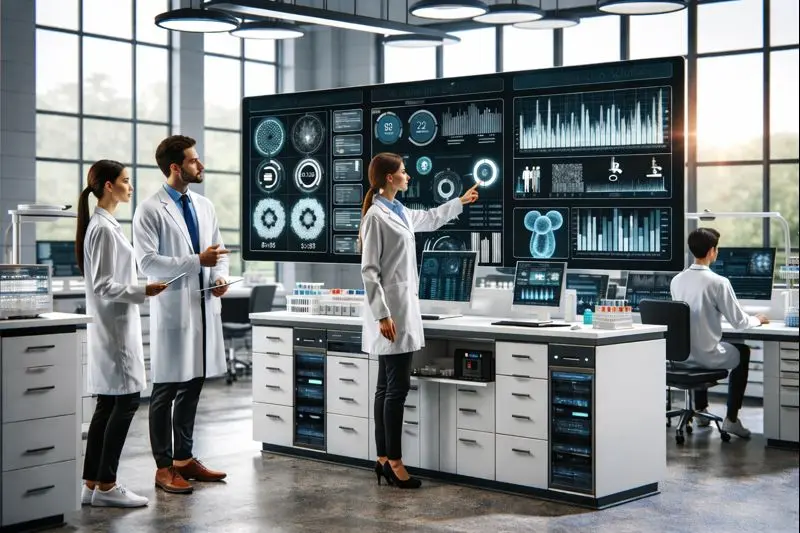Blog
Is Your Laboratory Information System Able to Support the Latest LIS System Technology?
July 14, 2025
Each year, the laboratory information system (LIS software) technology available to independent clinical laboratories and anatomic pathology groups continues to grow and become more advanced. That’s because the best laboratory information system vendors understand that their LIS lab customers need innovative new diagnostic lab software tools to withstand current challenges, such as declining reimbursement rates, rising costs, and staffing shortages.
Discover More: What is LIS in Healthcare?
The best LIS software technology is readily available, but are lab managers and directors fully aware of this, given their hectic day-to-day schedules?
Suren Avunjian, LigoLab’s CEO, thinks so. He recently noticed more awareness when discussing laboratory information system functions with potential new customers.
Discover More: What You Need to Know Before Contracting with LIS Laboratory Information System Companies
“We're seeing more and more well-educated prospects coming to us to discuss the exact lab information system issues that they are having, and that's been enlightening,” he said. “Overall, I think there's a lot more awareness of what laboratory information system companies are offering and where the LIS software constraints are. These potential new customers are doing their homework, and that benefits everyone.”
Avunjian also noted that the sales process between laboratory information system companies and medical labs typically takes several months to unfold, often including multiple LIS system demonstrations.
“The sales cycles are long, and they should be because this is such an important decision for the organization. Advanced pathology lab software is truly mission-critical. Fortunately, decision-makers at the lab level are paying attention, asking the right questions, doing their due diligence, and choosing the best LIS systems for their operations,” he said.
Discover More: Best LIS Software - Maximize Growth With Cutting Edge Pathology Lab Management Software
Still, across the entire laboratory spectrum, there is room for improvement, and a recent study published in Clinical Lab Products revealed nearly a quarter of respondents said they are unsatisfied or highly unsatisfied with their laboratory information system software.
A key source of this widespread dissatisfaction is that many labs are still relying on outdated LIS software, some more than a decade old, despite the availability of modern, innovative LIS healthcare technology designed to streamline and improve operations.
Discover More: Comparing LigoLab Informatics Platform with Legacy Laboratory Information System Software
Avunjian expressed concern that many labs are missing out on a decade’s worth of technological advancement. He noted that outdated LIS systems depend heavily on manual processes, which create inefficiencies in clinical lab workflows and hinder sustainable growth.
Compounding the issue, these manual workflows, when combined with ongoing staffing shortages among medical laboratory technologists, can have a serious negative impact on a lab’s financial performance.
Avunjian said this impact should be factored into the total cost of ownership for LIS systems and warned labs against staying with the status quo or choosing “cheap” LIS software solutions because the inefficient lab workflow they support leads to increased labor costs, staffing frustration, morale issues, longer processing time, and a higher potential for errors, all of which adversely affects patient care and lab revenues.
“It's crucial to understand that investing in up-to-date laboratory information system software isn't just about keeping up with technology. It's about ensuring overall operational efficiency, financial sustainability, and success in a challenging healthcare environment,” he said.
White Paper: Transitioning from CoPath to LigoLab - A Seamless Path to LIS System Modernization

Recent Advancements in Laboratory Information System Technology
Let’s take a closer look at how laboratory information system technology has evolved in recent years, giving lab operators still using legacy LIS systems a clearer picture of where the most significant advancements have occurred.
Cloud-Based Laboratory Information System Software Solutions:
Cloud-based LIS system solutions continue to gain popularity because they offer the lab greater flexibility, scalability, and accessibility. Additionally, providers across the entire healthcare continuum can access the data securely from various locations, thereby improving collaboration and streamlining clinical lab workflow and pathology lab management.
Industry Insights: Examining the Pros and Cons of Cloud-Based LIS System Solutions
Artificial Intelligence (AI) and Machine Learning (ML) LIS Lab Support:
Artificial intelligence and machine learning applications, once integrated into pathology LIS systems, can automate repetitive and routine tasks, improve data interpretation, and enhance diagnostic accuracy. When supported by modern medical laboratory information system functions, these technologies can assist in areas such as pattern recognition, anomaly detection, and predictive analytics.
Discover More: Best Practices for Preparing Medical Labs for AI Integration in Technical and Financial Operations
LIS Healthcare Interoperability Standards:
The emphasis on interoperability between laboratory software systems (LIS systems, EHRs, laboratory billing systems, etc.) continues to grow. Modern medical LIS software that supports standards such as Fast Healthcare Interoperability Resources (FHIR) and Health Level Seven (HL7) has helped facilitate the desired seamless communication between the laboratory and its provider clients.
Discover More: LigoLab Delivers the LIS System Interoperability Needed to Transform Medical Laboratories into Thriving Businesses
LIS System Rule and Automation Engines:
Modern laboratory information systems are built with rule and automation engines that create automation via decision-support trees. This contributes not only to direct cost savings that would otherwise be spent on labor but also to increased efficiency, reduced errors, and quicker turnaround times.
Discover More: How Lab Billing and Coding Automation Increases Laboratory Revenue
LIS Software with Fully Integrated Laboratory Billing Solutions:
The best LIS systems offer clients modern features and functionality encompassed within an all-in-one LIS software platform that also covers laboratory billing (lab revenue cycle management). Fully integrated laboratory billing solutions such as this excel in data integrity because all case and patient data is stored in one comprehensive informatics platform, enabling the lab billing module with full visibility of all technical operations and maximizing coding opportunities, eliminating the data silos and the need to synchronize master files across multiple laboratory software systems.
Direct-to-Consumer Lab Testing:
Mobile-friendly web portals and direct-to-consumer lab testing applications like TestDirectly (TestDirectly.com) enable both healthcare professionals and patients to access LIS system data (lab test results) on the go. The best LIS software platforms have adapted to support direct-to-consumer lab testing and a unified patient experience, providing real-time results for all stakeholders and facilitating faster decision-making.
Discover More: Highlighting the Versatility of the TestDirectly Direct-to-Consumer Lab Testing Portal
LIS Systems and Data Analytics:
The best LIS systems can incorporate advanced data analytics capabilities into the clinical lab workflow. This enables laboratories to use the insights gained from large datasets to make data-driven decisions that improve both operations and patient outcomes.
On-Demand Webinar: How Standardization and Enhanced Reporting Capabilities Improve Lab Workflow and Overall Business Operations
Advanced LIS System Reporting and Visualization Tools:
The best LIS system software platforms also feature improved lab reporting and visualization tools that enable laboratory data to be presented in a more understandable and actionable format, promoting better communication of test results to both healthcare providers and patients.
Discover More: How LigoLab's Pathology Lab Software Supports Lab Report Customization and Client Preferences
LIS Systems with Enhanced User Experience Capabilities:
Leading LIS lab vendors recognize the importance of user experience and have made intuitive, user-friendly interfaces a top priority. Today’s top LIS software includes customizable dashboards and widgets, drag-and-drop functionality, and streamlined workflows tailored to specific user roles.
Discover More: Understanding the Importance of Real-Time Analytics in the Modern Clinical Laboratory
LIS Systems and Compliance with Regulatory Standards:
Laboratory information system companies consistently update their LIS pathology platforms to keep pace with the ever-evolving regulatory standards. These updates help labs remain compliant with critical guidelines related to data privacy, security, and reporting requirements.
Industry Insights: Regulators Are Rewriting HIPAA - 2025 Survival Guide for Clinical & Pathology Labs

LIS Systems and Self-Assessment Questions
Now that we’ve examined the importance of deploying a modern medical laboratory information system software within the lab, let’s turn our attention to how the lab can determine the current state of its LIS technology and identify areas where improvement is needed.
To help with this evaluation process, we’ve compiled a list of questions that any lab can use for a self-assessment of its LIS system.
Data Silos and System Fragmentation - Does your lab use different laboratory software systems for managing various aspects of operations (such as financial, technical, and clinical data)?
Scalability - Can your LIS laboratory information system handle an increase in test volume and adapt to new tests or technologies without significant modifications?
Integration Capabilities - Does your lab information system seamlessly integrate with other laboratory software systems and devices (such as EHRs, laboratory billing systems, and analytical instruments)?
Data Management and Accessibility - How effectively does your lab’s LIS system manage, store, and provide easy access to lab data?
Future Planning and Technological Advancements - Is your LIS medical system able to keep up with tech advancements (like digital pathology solutions and AI integration)?
User Interface and Usability - Is your LIS system’s user interface intuitive and easy to use? Do staff members find it user-friendly for navigation and task performance?
Customization and Flexibility - Can the pathology software powering the LIS system be customized to fit a unique lab workflow?
Support and Maintenance - Does your LIS company adequately provide technical support and regular software updates? Are you satisfied with the response time and the quality of LIS lab support provided?
Performance and Reliability - Does the LIS system consistently perform without frequent downtime or errors?
Analytics and Reporting Capabilities - Does your laboratory information system software provide robust data analytics and flexible reporting options to support decision-making and operational insights?
Discover More: Stability and Performance - The Two Most Important Aspects of a Modern Laboratory Operation

At LigoLab, We Help You Win!
In today’s business environment, it's clear that medical labs need to leverage advanced LIS laboratory information system software technology to run a better business and support the dynamic needs of their laboratory clients.
At LigoLab, our approach begins with delivering the most modern, comprehensive, and flexible laboratory information system software available—and we take it a step further by backing it with exceptional white glove support for our customers.
If you’re interested in improved performance and productivity, and winning in your marketplace, contact us today. That way, you can see firsthand how our advanced LIS software solutions enable success and growth for all of our lab partners.






